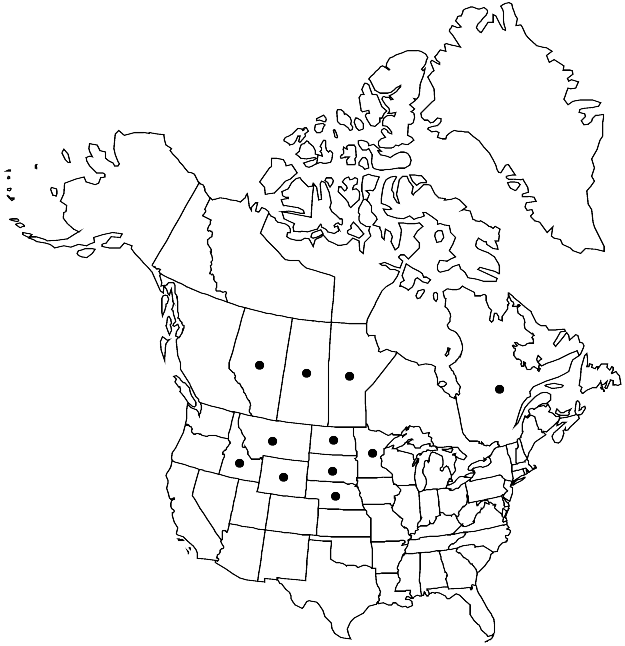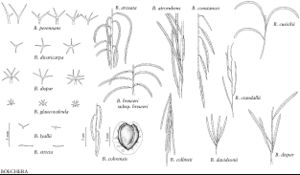Difference between revisions of "Boechera collinsii"
Taxon 31: 125. 1982.
FNA>Volume Importer |
FNA>Volume Importer |
||
| Line 14: | Line 14: | ||
|name=Arabis holboellii var. collinsii | |name=Arabis holboellii var. collinsii | ||
|authority=(Fernald) Rollins | |authority=(Fernald) Rollins | ||
| − | }}{{Treatment/ID/Synonym | + | }} {{Treatment/ID/Synonym |
|name=Arabis retrofracta var. collinsii | |name=Arabis retrofracta var. collinsii | ||
|authority=(Fernald) B. Boivin | |authority=(Fernald) B. Boivin | ||
| Line 32: | Line 32: | ||
|elevation=600-1400 m | |elevation=600-1400 m | ||
|distribution=Alta.;Man.;Que.;Sask.;Idaho;Minn.;Mont.;Nebr.;N.Dak.;S.Dak.;Wyo. | |distribution=Alta.;Man.;Que.;Sask.;Idaho;Minn.;Mont.;Nebr.;N.Dak.;S.Dak.;Wyo. | ||
| − | |discussion=<p>Though often treated as a variety of Arabis (Boechera) holboellii (e.g., R. C. Rollins 1993; G. A. Mulligan 1996), B. collinsii is easily distinguished from that species by having simple and 2-rayed (versus 4–8-rayed) trichomes proximally on stems, and narrower (0.9–1.5 versus 2–2.5 mm) usually non-secund fruits. The two taxa also show allopatric distributions, with B. collinsii found on the North American continent (usually east of the Rocky Mountains) and B. holboellii apparently confined to Greenland.</p> | + | |discussion=<p>Though often treated as a variety of <i>Arabis</i> (<i>Boechera</i>) holboellii (e.g., R. C. Rollins 1993; G. A. Mulligan 1996), <i>B. collinsii</i> is easily distinguished from that species by having simple and 2-rayed (versus 4–8-rayed) trichomes proximally on stems, and narrower (0.9–1.5 versus 2–2.5 mm) usually non-secund fruits. The two taxa also show allopatric distributions, with <i>B. collinsii</i> found on the North American continent (usually east of the Rocky Mountains) and <i>B. holboellii</i> apparently confined to Greenland.</p> |
|tables= | |tables= | ||
|references= | |references= | ||
| Line 56: | Line 56: | ||
|publication year=1982 | |publication year=1982 | ||
|special status= | |special status= | ||
| − | |source xml=https://jpend@bitbucket.org/aafc-mbb/fna-data-curation.git/src/ | + | |source xml=https://jpend@bitbucket.org/aafc-mbb/fna-data-curation.git/src/8f726806613d60c220dc4493de13607dd3150896/coarse_grained_fna_xml/V7/V7_505.xml |
|tribe=Brassicaceae tribe Boechereae | |tribe=Brassicaceae tribe Boechereae | ||
|genus=Boechera | |genus=Boechera | ||
Revision as of 17:58, 18 September 2019
Perennials; usually short-lived; sexual; caudex not woody. Stems usually 1 per caudex branch, arising from center of rosette near ground surface, (1.5–)2.5–8 dm, densely pubescent proximally, trichomes simple and short-stalked, 2-rayed, to 1 mm, sparsely pubescent or glabrous distally. Basal leaves: blade oblanceolate, 1–7 mm wide, margins entire or dentate, ciliate along petiole, trichomes (simple), to 0.7 mm, surfaces moderately to densely pubescent, trichomes short-stalked, 5–8-rayed, 0.15–0.4 mm. Cauline leaves: (8–)15–40, concealing stem proximally; blade auricles 1–3 mm, surfaces of distalmost leaves usually sparsely pubescent. Racemes (15–)30–90-flowered, usually unbranched. Fruiting pedicels reflexed, abruptly recurved at base, otherwise straight, 4–13 mm, glabrous or sparsely pubescent, trichomes usually simple. Flowers descending to pendent at anthesis; sepals pubescent; petals usually white, rarely lavender, 4–6 × 0.8–1.5 mm, glabrous; pollen ellipsoid. Fruits strongly reflexed, usually appressed to rachis, rarely somewhat secund, straight, edges parallel, 3.5–6 cm × 0.9–1.5 mm; valves glabrous; ovules 70–126 per ovary; style 0.2–0.5 mm. Seeds uniseriate, 1–1.4 × 0.8–1 mm; wing continuous (rarely absent), to 0.1 mm wide. 2n = 14.
Phenology: Flowering May–Jun.
Habitat: Rocky and gravelly hillsides, prairies, open woods, floodplains
Elevation: 600-1400 m
Distribution

Alta., Man., Que., Sask., Idaho, Minn., Mont., Nebr., N.Dak., S.Dak., Wyo.
Discussion
Though often treated as a variety of Arabis (Boechera) holboellii (e.g., R. C. Rollins 1993; G. A. Mulligan 1996), B. collinsii is easily distinguished from that species by having simple and 2-rayed (versus 4–8-rayed) trichomes proximally on stems, and narrower (0.9–1.5 versus 2–2.5 mm) usually non-secund fruits. The two taxa also show allopatric distributions, with B. collinsii found on the North American continent (usually east of the Rocky Mountains) and B. holboellii apparently confined to Greenland.
Selected References
None.
